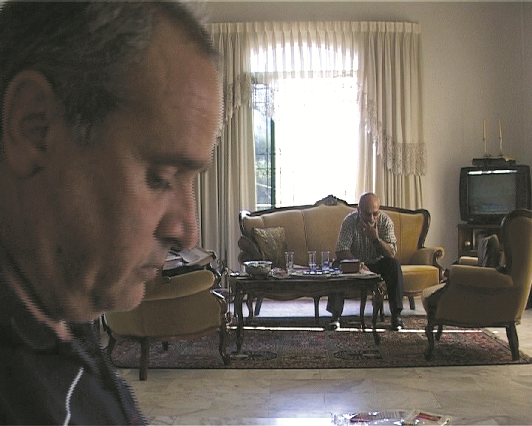A House in Jaffa
Excerpts from the conversation in the living room
Participants: N= Nahle Chacar, G=Gaby Aabed, S=Sami Bukhari
S: Tell me about your house.
N: A Moroccan family used to live in this house. … It was dilapidated, and I knew it would require massive renovation. It was a privately-owned property, so I couldn’t renovate, but I had made plans for the future. I had a 2.5-room apartment in a housing block. When I bought the house, the area was not built up, and there was no real street.
S: Even today your street is ill-cared for…
N: I bought the house, which was one room at the time, for the price of a Fiat 127. I sold the car for 2,000 dollars and added another 2,000. It was a good deal. People didn’t want to buy property in run-down, empty areas. I did nothing with the house for fifteen years, until my brother was looking for a house, and I suggested that we renovate and live together in the same building. So we added another floor for my mother. Before we began construction I visited the site one day and saw that the walls had fallen down. The roof collapsed due to the rains. It took me five years to get a building permit and return the house to its former condition. During that period the policy was to drive the Arabs out of Jaffa towards Ramla and Lod, replacing the Palestinian population with a wealthy Zionist population. Despite that policy, the inhabitants clung to the place. It was during Chich’s6 term. Official declarations were heard at the time about the expulsion of inhabitants from the place. Today it is called transfer; we called it a Judaization of Jaffa. In places where there is no planning, the planning should be carried out first by the municipality. Today, unlike the past, citizen groups too can initiate plans.
S: But can the municipality refuse to grant one a permit?
N: The municipality can authorize a plan which you, as an individual, cannot implement, unless you are a man of means. And the wealthy are usually not the Arabs.
G: If we are not organized, any plan may be implemented. Had we not been aware and alert, all of us would be living outside Jaffa today. But because we are conscious of the policy, we have managed to change it and introduce an alternative. We have succeeded in voicing our personal and professional opinions. Today the Palestinian population is taken into account, and building permits are given. This is also manifested in the fields of conservation and welfare services. We support development, as long as we are a part of it too.
N: The land in this area is considered Absentee property. Today, all this property is in the hands of the State of Israel.
G: Not everything.
N: Nearly 95 percent. There is no ownership of land. If you want to buy a house, you must get the approval of the landlord. You have to pay the land registry tax, and then you are considered statutory tenant. If you want to add a floor, you need the owner’s consent.
N: Land registry takes twenty years; until then you own no property. It is almost impossible to register land. They prevent you from doing so through various bureaucratic procedures.
G: Since 1948 the State of Israel has been an agent managing Arab property. Today, we live in the houses of deported Palestinian families, state-managed properties.
N: Even if you buy the property, the rights to the land are not yours.
G: The purchase right is limited. Any addition requires approval. The Palestinians were dispossessed of their property, and the process still continues. If a father doesn’t leave a will and one of his children lives abroad, his part in the inherited property is automatically transferred to the State.
N: The law was intended to dispossess Palestinians of their property. The Muslim community is considered absentee, and its property is confiscated. Before 1948, 1/16th of the country’s land belonged to the Wakf (Muslim religious authority).
G: In 1948 the Wakf was located in East Jerusalem. Being outside Israel, it was considered absentee and its property was confiscated, including mosques, graveyards and schools.
N: Why haven’t they touched Christian property? Because of the Church.
G: Israel couldn’t confront the European countries which supported its establishment.
N: Had the Muslims still owned Wakf property, they wouldn’t have had to work today.
G: That property could have solved all the housing and education problems. The State allocates 10% of Wakf property to the Muslim community—that’s nothing. The laws are intended for the welfare of the State and not that of the Arab citizens from within and from without. Even after 1948, when the real owners were given the opportunity to redeem their property, they were forced to pay the “statutory tenant” whom the State housed on their property.
N: The singer who sings “Oh Oppressor,” do you think he sings that song for no reason…
